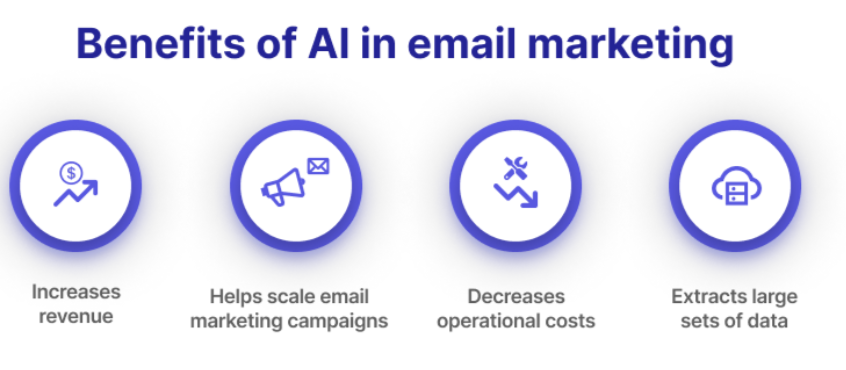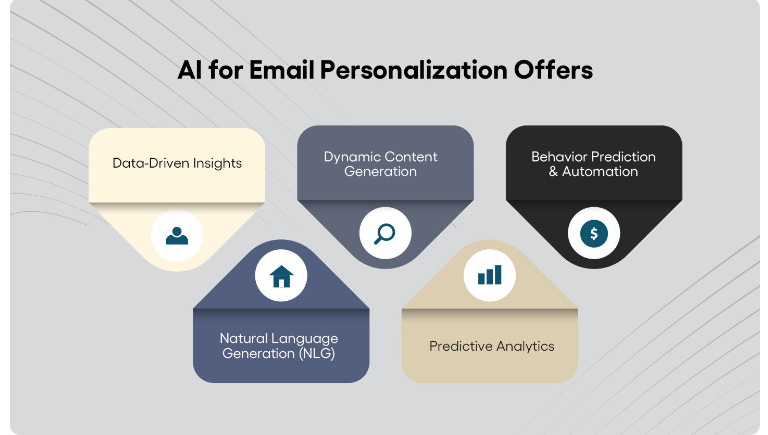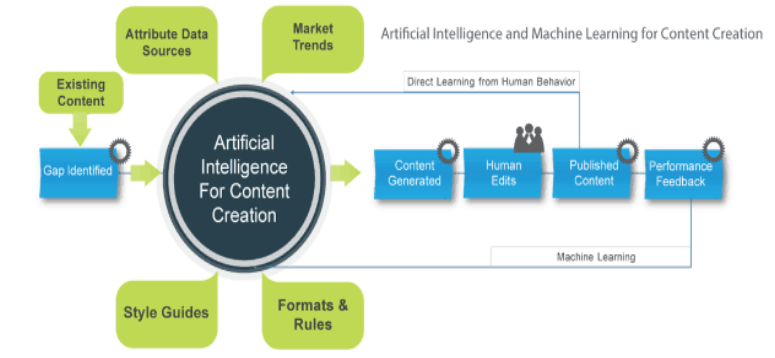AI in email marketing allows for unparalleled personalization and efficiency, transforming how businesses communicate with their audience. Whether it’s optimizing send times, personalizing messages, or segmenting audiences,
AI’s capabilities are vast. And when it comes to success in leveraging technology for market success, look no further than Flying V Group.
They have mastered the art of integrating AI into email strategies, ensuring that your campaigns are not only effective but also deliver substantial ROI. Dive into this guide to understand how AI can revolutionize your email marketing efforts and keep you ahead of the competition.
Understanding AI in Email Marketing
AI in email marketing introduces intelligence and adaptability that can significantly transform campaign strategies. At its core, AI involves using algorithms and machine learning to analyze data, predict outcomes, and make decisions, often in real time.
How AI Works in Email Marketing:
Data Analysis: AI processes vast amounts of data on customer behavior, preferences, and engagement history to tailor email campaigns more precisely.
Predictive Analytics: It forecasts future behaviors, helping marketers to anticipate needs and customize communications.
Automation: From segmenting audiences to scheduling emails, AI automates repetitive tasks, allowing marketers to focus on creative and strategic work.

Enhanced Personalization: AI enables hyper-personalization of email content, ensuring that messages resonate with individual recipients based on their specific interactions and interests.
Optimal Timing: AI can determine the best times to send emails based on user activity patterns to maximize open rates and engagement.
Improved Efficiency: Reduces the time and effort needed to manage large-scale email campaigns while increasing their effectiveness.
Incorporating AI into your email marketing efforts streamlines operations and delivers a more personalized experience to your customers, fostering stronger connections and boosting overall engagement.
Segmentation and Targeting
AI has revolutionized the approach to segmentation and targeting in email marketing, turning broad, generic messaging into highly tailored interactions that speak directly to each recipient’s individual needs and interests.
How AI Enhances Segmentation:
- Deep Data Analysis: AI algorithms delve into customer data pools—examining past purchases, browsing habits, and engagement—to segment audiences precisely.
- Behavioral Insights: It identifies patterns in customer behavior that may not be apparent to human analysts, allowing for more nuanced segments.
Examples of AI-Driven Segmentation Techniques:
Predictive Analytics: This technique uses historical data to predict future actions, such as the likelihood of a customer purchasing based on their engagement trends. Marketers can create “highly likely to purchase” segments to tailor emails to drive conversions.
Real-Time Segmentation: AI adjusts segments dynamically as new data comes in. For instance, if users browse more frequently, AI can immediately shift them into a “high engagement” segment and adjust the messaging accordingly.
By leveraging these advanced AI techniques, you can ensure that every email campaign reaches the right audience and resonates on a more personal level.
Personalization at Scale
AI is transforming email marketing by enabling personalization at an unprecedented scale. Gone are the days of one-size-fits-all marketing emails. AI helps create highly customized content that feels personally crafted for each recipient.
Role of AI in Crafting Personalized Email Content:
Individualized Messaging: AI analyzes user data such as past purchases, email interaction rates, and browsing behavior to generate content that speaks directly to each customer’s interests and needs.

Dynamic Content Creation: Content elements like images, offers, and product recommendations can be automatically swapped in and out of emails based on the recipient’s profile, making each email feel bespoke.
Benefits of AI-Driven Personalization:
Increased Engagement Rates: Customers who receive content relevant to their interests are more likely to engage with the email, leading to higher open and click-through rates.
Enhanced Customer Retention: Personalized emails build a stronger emotional connection with customers. They feel understood and valued, which significantly boosts loyalty and reduces churn.
By utilizing AI to personalize email content at scale, businesses can achieve a level of customization previously unattainable without substantial resources. You can leverage this technology to ensure that your email campaigns are tailored and highly effective in maintaining engagement and fostering lasting customer relationships.
Optimizing Send Times
Optimizing send times is crucial for the success of any email marketing campaign, and AI is a game-changer in this arena.
AI-driven tools can analyze vast amounts of data to pinpoint when individual recipients are most likely to open their emails. This involves studying past behaviors, such as when users typically check their email, how they interact with different types of content throughout the day, and even their time zone differences.
By leveraging AI, marketers can move beyond generic best-time-to-send theories into a more precise, personalized strategy. This means each email is delivered on the best day and at the best hour and minute for each recipient.
The impact of such timely delivery is profound. Campaigns benefit from significantly higher open rates, as emails are more likely to top the inbox during peak engagement times. Moreover, with emails arriving at opportune moments, click-through rates and overall campaign effectiveness also show marked improvement.
AI doesn’t just help you reach your audience; it ensures you reach them when they are most receptive. For businesses looking to enhance their email marketing efforts, Flying V Group employs such AI capabilities to ensure that every email reaches the inbox and does so when engagement is most likely, optimizing overall campaign performance and driving better results.
Automated Content Creation
Automated content creation via AI tools revolutionizes email marketing by ensuring consistency and relevance in every message sent. These AI systems can generate compelling email content that resonates with diverse audiences by leveraging data insights to tailor messages to individual preferences and behaviors.
AI in Content Creation:
AI tools utilize natural language processing (NLP) to craft text that is not only grammatically correct but also stylistically aligned with the brand’s voice. By analyzing previous successful emails and user engagement metrics, AI can produce content that is more likely to engage and convert, from catchy subject lines to persuasive body copy.

Advantages of AI-Driven Content Generation:
Consistency: AI ensures that every piece of content adheres to the same high standards of quality and maintains the brand’s voice across all communications, which is crucial for brand identity.
Relevance: By accessing and analyzing customer data, AI personalizes content to match the interests and needs of recipients, significantly boosting the relevance of each email.
Efficiency: Automating the content creation process reduces the workload on human teams, allowing them to focus on strategy and creative endeavors that require a human touch.
Testing and Optimization
A/B testing is a vital component of any robust email marketing strategy, enabling marketers to refine their campaigns based on direct feedback from their audience. This method involves sending two variations of an email to a small percentage of your recipients to see which version performs better before rolling out the more successful one to a larger audience.
Incorporating AI into this process enhances it significantly. AI can automate various elements of A/B testing, from generating different email subject lines to testing different calls to action. This saves time and ensures the variations are based on logical deductions from large datasets rather than just gut feelings.
Benefits of AI in A/B Testing:
Efficiency: AI quickly determines which elements are most effective, speeding up the testing cycle and allowing for more rapid improvements.
Accuracy: By analyzing results from A/B tests, AI can offer precise recommendations for adjustments, ensuring that each campaign iteration is optimized for performance.
Scalability: AI can handle multiple tests simultaneously across different segments, allowing for more comprehensive optimization strategies.
Predictive Analytics
Predictive analytics is a fascinating facet of AI that allows email marketers to anticipate customer behaviors and future trends, transforming how campaigns are structured and executed.
By analyzing historical data and identifying patterns, AI can forecast which customers are likely to engage, convert, or even churn. This proactive approach enables marketers to tailor their strategies more effectively, ensuring their messages are always relevant and timely.
Benefits of Predictive Analytics in Email Marketing:
Targeted Campaigns: Knowing in advance which customers are most likely to respond to specific offers allows for highly targeted campaigns, increasing the efficiency and effectiveness of each email sent.
Enhanced Personalization: AI can predict the type of content that will resonate with different segments, enabling marketers to personalize emails to a degree that significantly lifts engagement rates.
Optimal Timing: Predictive analytics can determine who to target and the best time to reach them, ensuring emails are opened and read.
With predictive insights, email marketing campaigns can move from a reactive to a strategically proactive approach. Flying V Group leverages this technology to help clients send the right message to the right person at the right time, maximizing the impact of every email campaign and driving superior marketing results.
Embrace AI in Email Marketing with Flying V Group
Embracing AI in email marketing is not just a trend; it’s a strategic necessity. From optimizing send times and personalizing content at scale to employing predictive analytics for targeted campaigns, AI transforms how we connect with audiences.
Flying V Group is at the forefront of integrating AI to deliver a comprehensive marketing strategy that boosts engagement and ROI. Don’t let your business lag behind—harness the power of AI with Flying V Group and elevate your email marketing to new heights of effectiveness and efficiency.
FAQs
1. What is AI in email marketing?
AI in email marketing uses artificial intelligence technologies to automate, optimize, and personalize email campaigns based on data-driven insights.
2. How does AI improve email personalization?
AI analyzes individual behaviors and preferences to tailor emails to each recipient, enhancing relevance and engagement.
3. Can AI determine the best time to send emails?
Yes, AI uses data on past recipient behaviors to predict the optimal times for sending emails to maximize open and response rates.
4. What is predictive analytics in email marketing?
Predictive analytics uses historical data to forecast future customer behaviors, helping marketers tailor campaigns to anticipated needs and interests.
5. How does AI help with A/B testing in email marketing?
AI automates creating and testing different email versions, rapidly analyzing results to identify the most effective campaign elements.






0 Comments